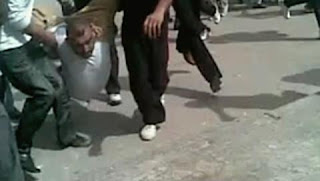A day earlier, security forces trying to crush almost six months of demonstrations against the authoritarian
leadership fired on thousands of marchers, killing 17 people, most of them in suburbs of the capital Damascus.
The crackdown has drawn international criticism and sanctions. The European Union announced Friday that it was banning oil imports from Syria, which will cost the embattled regime millions of dollars each day.
While Assad brushed off earlier condemnation as foreign meddling, the oil embargo is significant because Damascus gets about 28 percent of its revenue from the oil trade and sells fuel to France, Germany, Italy, and the Netherlands. Some analysts believe Syria is getting financial assistance from Iran, which would cushion the EU blow.
The EU will do more, the bloc’s foreign policy chief, Catherine Ashton, said yesterday after meetings in Poland with top diplomats of member states. Ashton told reporters in Poland the ban on Syrian oil imports was an attempt to achieve a political outcome by economic means.
“And we will continue to put that pressure on, to look for ways of doing so, to try and support the people,’’ she said.
The United States has hit more than 30 Syrian officials, including Assad himself, with economic sanctions, banned any US import of Syrian oil or petroleum products, and frozen all Syrian government assets subject to American jurisdiction. But the United States has isolated Syria for decades and has little leverage with the regime.
Yesterday, US State Department spokeswoman Victoria Nuland welcomed the EU oil import ban.
“The United States and our international partners will continue to add political and economic pressure in an effort to force President Assad to step aside and allow the Syrian people to effect a peaceful transition,’’ Nuland said.
The United Nations says some 2,200 people have been killed since March as protesters take to the streets every week, despite the near-certainty that they will face bullets and sniper fire. The regime is in no imminent danger of collapse, leading to concerns that violence will escalate.
In the Damascus suburb of Douma yesterday, thousands of mourners marched behind the body of a man killed by gunfire Friday. Mourners seen on video posted online by residents shouted “freedom’’ and “God is great.’’
Activists said troops yesterday raided a village near the town of Maaret al-Numan in the province of Idlib, killing two people.
The Local Coordination Committees activist network and the London-based Syrian Observatory for Human Rights reported the deaths.
The Observatory cited a local activist saying troops taking part in yesterday’s raid in Idlib, an area close to the Turkish border, were searching for Adnan Bakkour, attorney general for the central Hama Province, who appeared in two videos Wednesday declaring his resignation.
Bakkour’s alleged resignation appeared to be a high-profile defection, but authorities said that terrorists had kidnapped him and forced him to make the recording. Bakkour denied that in one of the videos.








